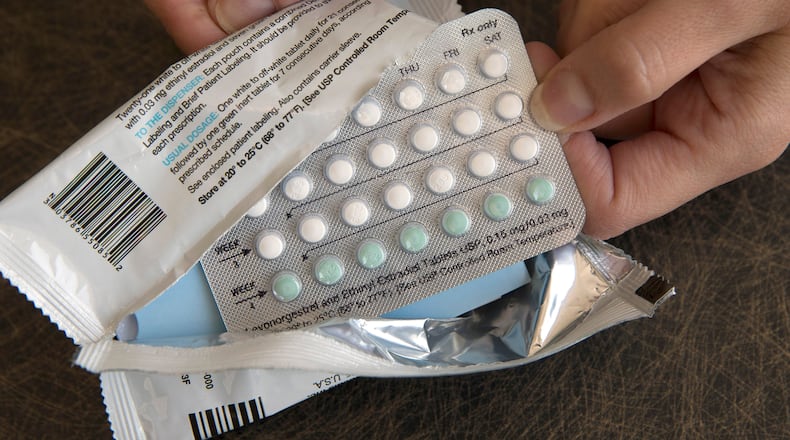A new front is opening in Georgia in the battle over sex-related medicine: telehealth.
A company that allows patients to consult with a doctor by phone and receive their birth control or HIV prevention drugs by mail has been quietly testing in Georgia and plans its public launch Monday.
“There’s a big portion of the population that can’t go to the clinic for one reason or another; either they have two or three jobs and can’t fit the time in,” or they fear other people’s reactions, said Hans Gangeskar, the CEO of the company, called Nurx (as in new-Rx).
“We think this telemedicine approach will change that because you don’t have to go to a city clinic or an HIV clinic or a sexual health clinic,” Gangeskar said. “You can do it all from the privacy of your own home. We think that is going to make a difference.”
With Nurx, no patient with a line of customers behind her would face a pharmacist voicing moral objections to giving her contraception. No one would see a patient seeking the HIV preventive drug PrEP walk up to a mobile clinic for gay men.
Experts say that kind of stigma has contributed to an enormous gap in treatment of black men at risk of HIV in Georgia, especially in rural areas.
“That’s the problem with access geographically, but then probably also access as far as stigma or taboo goes,” said Nurx’s medical director, Dr. Jessica Knox. “We’re based on eliminating geographic lack of access and also providing access in a private, nonjudgmental way.”
With Nurx, a 13-year-old with access to a library computer could obtain her own birth control without ever talking to anyone in her county. She would not have to get a ride or be seen by other patients in a waiting room. Georgia law does not require parental permission for 13-year-olds and up.
The service offers about 50 drugs, including monthly contraception, PrEP, and “emergency contraception” drugs such as ella and Plan B that are taken after sex and intended to prevent conception. Plan B does not require a prescription and is already available by mail, for example on Amazon. Without the overhead of a clinic, Nurx officials said, the first month of contraception including the consultation is $15.
Shaunae Motley, who deals with rural teens through the educational nonprofit she works with in four rural Georgia counties, thinks it’s a fantastic idea.
“I think that this will really be groundbreaking, not only for young people but for adults as well,” said Motley, the director of programs at Quest for Change.
“With young people in general, especially in rural arreas, there’s a stigma,” Motley said. “Any time you have to go to the clinic everyone is looking at you. Like, why are you here. Everybody knows each other.”
Not everyone is so excited. Mike Griffin, the pastor at Liberty Baptist Church in Hartwell and a public outreach member of the Georgia Baptist Mission Board, is concerned. Griffin believes the line between contraception and drugs that cause abortion is not so clear with drugs such as Plan B. And when it comes to teenagers, parents ought to be in the loop.
“When you’re talking about an adult, you’re talking about personal responsibility,” Griffin said. “When you’re talking about a teen, you’re talking about parental responsibility.”
Nurx’s technology went live in Georgia this spring, but its official launch is Monday. Nurx has an app that it says is the easiest way to interact with the company. But about 20 percent of Nurx patients don’t communicate by smartphone.
With Nurx, patients first must scan their IDs and, if they have it, insurance information. The documents can be uploaded via the smartphone app or on Nurx’s website from a regular computer. The patient fills out a standard medical checklist. Then the patient consults with the doctor via the message app or text, or if necessary, Nurx can talk to the patient by phone.
Nurx touts texting as a benefit, first for the ease and privacy patients prefer, but also because days, weeks or months later, patients can text their doctor or nurse a question that occurs to them and continue communicating. Nurx officials believe they have much more detailed knowledge of their patients because the interaction isn’t limited to the questions and answers provided in a 15-minute visit.
Patients for contraception must provide their blood pressure, but under the rules of the U.S. Centers for Disease Control and Prevention, they’re allowed to get it measured themselves, for example at a drugstore, and tell the numbers to Nurx on their own.
Nurx has hired one full-time physician and one part-time physician in Georgia. They are the only prescribers now, but later Nurx hopes to add advanced nurses who are allowed to prescribe. Nurx launched first in California in 2015 and now operates in 20 states as it moves into more conservative territory, including Georgia and Tennessee.
Stay on top of what’s happening in Georgia government and politics at PoliticallyGeorgia.com.
About the Author
Keep Reading
The Latest
Featured




